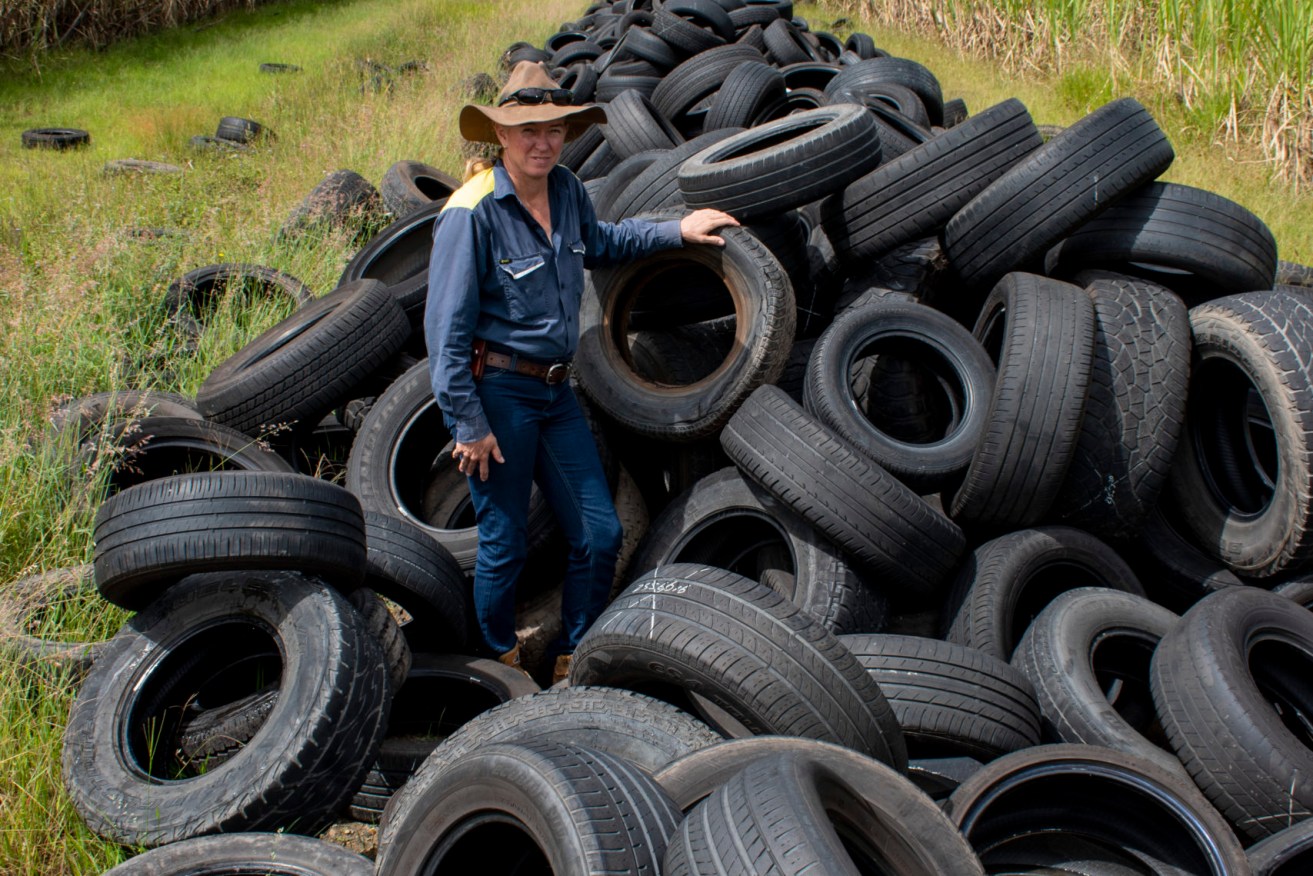Trash talk: Why these new dumping grounds have our farmers filthy
From mountains of old tyres to truckloads of live crocodiles, Queensland farmers are fed up with the rubbish turning up on their properties.


Rocky Point cane grower Suzie Burow-Pearce amid the tyres illegally dumped on her property. (Photo: Australian Canegrower)
A 50-metre stockpile of tyres and a truck load of live crocodiles are two of the more bizarre unwanted ‘deliveries’ that have landed on farms across Queensland in a growing trend that has authorities alarmed.
Peak sugarcane organisation, Canegrowers, says that rubbish better suited to the local tip is being deliberately dumped on farms, especially near regional centres and large towns.
Its chief executive Dan Galligan said the illegal activity was escalating and causing distress for farmers who were seeing their properties potentially contaminated.
He is seeking urgent talks with local government representatives, believing high costs for using council refuse tips are responsible for the surge in illegal dumping.
A Local Government Association of Queensland spokesperson said the organisation was open to having those discussions.
“It’s a huge and distressing problem for many cane growers and other farmers who are doing their best to produce sustainable food and fibre,” Galligan said.
“Finding piles of household garbage, mountains of building rubble, old appliances, broken furniture and tyres is all too common for farmers close to Queensland towns and cities.
“It is infuriating that people are passing on their mess and the cost of its disposal to someone else by dumping on the farms that grow the food they eat.”
A massive pile of some 1300 tyres dumped on a Rocky Point cane farm between the Gold Coast and Brisbane is possibly the most brazen act that farmers have seen amid the dumping spree.
As grower Suzie Burow-Pearce told the Australian Canegrower magazine, she suspects the tyres were dumped on her property overnight on February 9, an operation that took forward planning and careful execution to remain concealed.
“We could see from the tyre marks that whoever did it had actually turned on the road and reversed about 200 metres down the track before dumping the tyres almost out of view from the road,” Burow-Pearce said.
“Due to the number of tyres, they must have either had two trucks or did it in a couple of runs. It couldn’t have been an easy thing to do in the pitch dark.”
While the trashing of her farm was bad enough, worse was to come when police and the local council both duck-shoved responsibility for dealing with the matter, leaving Burow-Pearce with disposal costs of more than $7000 out of her own pocket.
Galligan said the Burow-Pearce case highlighted the struggle growers across the state faced when trying to get help to clean up their trashed farms.
“Councils often state they have no power or responsibility and police seem unable to assist in tracking down culprits,” Galligan said.
“While we welcome the Queensland Government’s provision of grants to assist with the most difficult clean-up tasks and provide more resources to local government to investigate, it would be better for everyone if this disgusting practice never happened in the first place.
“I urge Queenslanders to please stop doing this. Please show respect to the farms growing your food and do not use them as dumps.”
The Rocky Point branch of Canegrowers has lodged an application for a clean-up grant on Burow-Pearce’s behalf, however it could be weeks before they receive notice of the outcome.
While that campaign continues, Canegrowers is lobbying tech giant Google to update its Google Maps platform, after the app was blamed for guiding truck drivers to wrong locations on farms throughout North Queensland.
In one case, a truck carrying live crocodiles to a Mareeba crocodile farm became bogged on a neighbouring cane farm when the driver followed incorrect guidance from the app.
Farmers say it’s a growing problem and could jeopardise the safety of farmers and transport operators if large trucks are being directed to properties without adequate infrastructure.
In the Mareeba incident, the farmer and driver were lucky to escape injury, both when the truck became bogged in an irrigation channel and during the rescue mission to free the vehicle and its exotic livestock.
The farmer, Trevor Aldi, told the North Queensland Register the truck was perched on a “serious lean” while efforts were made to free the vehicle.
“Thankfully it stayed upright and none of its occupants escaped,” he said.
Aldi said he had dealt with many stray drivers following Google Maps on his property in the past, but never any carting five-metre crocodiles.
“I hope never to again,” he said.








